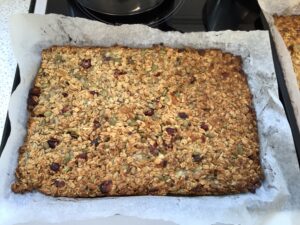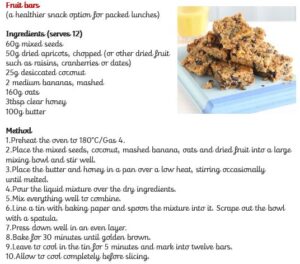Design & technology: food
This week, Year 2 have been using their design and technology food preparation skills to make our latest recipe, fruit bars.
Some of the skills we used to make our product included:
- snipping
- mixing
- measuring
- mashing
- using the oven and hob safely






After the cooking, we carried out the evaluation of the product and we enjoyed the tasting our product together.







Help at home: Ask your child/children what food preparation skills they have used in this learning and can they demonstrate these using the recipe they have brought home.

Goodbye Reception!
I can’t believe your Reception year has come to an end. Since returning in March, we’ve shared many amazing memories together. You’ve all had a tremendous first year at school and I’m extremely proud of each and every one of you. I love forward to seeing you all in your new Year 1 classroom in September. Have a wonderful summer!
Some highlights since March…









Moortown Oscars 2025
Thank you so much for a fantastic year. We wrapped it up in style with a great party last night. Awards were given, dances were performed and songs were screamed!
We wish every child the very best for their future and we know they’ll go on to do great things.
Moortown will miss them dearly.
Miss Wilson, Mrs Charlesworth and Miss Kidd
x





























Design Technology: Eggy Carts
Yesterday, the children finished off their Eggy’s carts. They added safety features like seat belts, crumple zones and a roll cage. Take a look at their fabulous work!











To complete our DT project, the children then had to test their carts against the design brief. We completed two tests:
- if it was moveable (roll test);
- if it would protect Eggy when the vehicle crashed (crash test);
For the crash test, the children pushed their cars down a ramp into a wall to see if Eggy would still be in intact – some Eggys did not make it. Take a look at our SMASHING experiment!








Help at home: What was your child’s favourite part of the making process? What would they improve next time? What was one thing they found difficult?
DT: Eggy crash tests
The time has come to see whether our cracking karts will protect Eggy or see him scrambled!
Our teamwork has been eggcellent but now our brains are fried. Good luck, Eggy. We hope our engineering has been no yolk.









Did every Eggy survive?










Food Technology: Bread!
Year 5 created bread in food technology this week. We measured, poured and kneaded! The children created different shapes before cooking. Year 5 REALLY really loved it! The recipe has been sent home with them today so, why not try it at home?












Living and Learning: Being healthy themed week
It was a busy end to our being healthy themed week with lots of visitors to support this key aspect of Living and Learning.
Matt, from Leeds Well School Partnership, visited to deliver an assembly all about being healthy. There were key messages about being active, sleep and healthy eating. We also got to hear our two winning entries that have now been published in a book titled Move Well looking at children’s relationship with physical activity and sport. Well done to Florence and Soham.






Catering Leeds, who provide our school meals, came to deliver their Bushtucker trial workshop all about healthy eating. Here, the children were able to taste blind taste and blind feel different fruits and vegetables. There were lots of new foods to explore.

Foot tech, who support our PE curriculum, came to deliver some of the games which we’ve enjoyed this year in a fun and active way.



Our final visitor was Hazel from D:side, a health charity. We started by thinking about the three main things that we need to put in our body – food water and air. We also looked at different parts of our body and what their job is. Finally, we thought about our emotions and used this car wash activity to share compliments to our friends while they walked down the ‘car wash’.

Another way we’ve thought about our emotional health is mindfulness and ways we can calm our mind. The children enjoyed using their glitter bottles to watch the glitter settle just like our emotions. We hope the children enjoy using these at home.



In our circle time, the children shared the ways they are going to improve their health following our learning.
I’m going to play outside more.
I’m going to drink more water.
I’m going to have less screen time and TV time.
I’m going to go to bed earlier.
I’m going to eat less sweets and chocolate.
I’m going to be more active on my way to school.
I’m going to try new foods.
I’m going to make sure I keep my body clean.
Help at home: support your child to complete the online health questionnaire homework to share your child’s views on health at school.
DT: Eggy Karts
Y6 have been busy working on their Eggy Karts.
We are following a design criteria:
- sturdy
- durable
- mobile
- protects Eggy
- aesthetically pleasing
We’ve used saws, clamps, bench hooks and glue. Later in the week, we’ll test them to see if they really do protect Eggy from getting scrambled.
Help at home by asking how your child stayed safe in these lessons.







They look great so far!



Being Healthy Week!
This week at Moortown has been Being Healthy Week! All week we’ve been focusing on how we can stay healthy both physically and mentally. Here are some of our highlights of the week…
We started the week talking about healthy eating and how we can ensure we have a balanced diet. Your children were very knowledgeable on this and suggested various healthy meals/snacks that include all our important food groups.
We then were lucky enough to have a visit from British Military Martial Arts (BMMA). Your children played lots of fun games and got to showcase their new skills. They loved giving martial arts a go and exploring a new way of keeping fit.
This week, we’ve spoke a lot about mental health and its importance. We often find that doing things to promote our physical health, such as exercise and eating healthy, also help our mental health. Keeping our minds healthy is just as important as keeping our bodies healthy and we discussed various ways to do this. We played a fun game of self-care bingo where the children chose their favourite self-care techniques and had to act them out.
We had another excellent session with some visitors from City of Leeds Basketball. Your children did basketball in PE last year so this was a great opportunity to recap, learn and practise some basketball skills and ask the professionals all about their experiences in the sport.



One of our favourite moments of the week was our Hip Hop workshop with Phil. He spoke all about the culture of Hip Hop and how we can express ourselves through art, literature, music and dance. We then had the opportunity to watch Phil perform some amazing Hip Hop dancing and learnt a few moves ourselves! We all loved it!
As part of our Being Healthy Week, we had our annual sports day! It’s always a brilliant day in the sunshine and the children were all amazing. Medal or not, we were proud of all of your children as everybody demonstrated our School Games values:
- determination
- honesty
- passion
- respect
- self-belief
- teamwork
Your children always love a visit from D:Side and this week, the session was on drug education. We learnt all about alcohol – what it is, the laws around it and how we can stay safe and healthy when we’re older. We did some role plays of how to say no if somebody is trying to get you to do something you don’t want to. The session taught us some really important information and was fun and engaging too!



Overall, we had an amazing, jam packed week and learnt so much about how we can always stay healthy!
Healthy Week
This week was our themed week: ‘Healthy Week’. Over the last 5 days, we have been off timetable and have been learning about lots of different ways to be healthy.
We kickstarted it with our new sessions of ‘Feelings First’. In these sessions, we have a feeling for the week and we discuss everything related to it: the definition; what happens if we have too much or too little of this emotion; what it might look like on us or others; how it might impact us or others; what other emotions are related to it; and how we can regulate it. We looked at 4 different feelings: influenced, offended, excluded and resentful.
On Monday, we had the British Military Martial Arts come to complete a session. The children were able to learn how to do a front kick, a jab, a cross punch and a side kick. The children got into teams to race against each other.




After we learn about allergies and how to help someone if they are having an allergic reaction.

Help at home: Which 3 do you think are the most important?

Our next lessons were about personal hygiene and dental health. We discussed what we use to stay clean, what areas should be cleaned the most, where does bacteria like the most, what causes damage to our teeth and where do you visit regularly to look at your teeth. The children created posters about the importance of personal hygiene and handwashing.



Did you know that in a can of Coca-Cola there is 35 grams of sugar – that’s the same as 10 teaspoons of sugar! Year 5 researched how much sugar was in their favourite snacks.

We finished off the afternoon with skipping school. The children practised and perfected partner skipping. They then showed off their amazing skills to the rest of the school!






On Tuesday, we started off the day with a road safety assembly and a feelings first session. We then had a zoom about about healthy eating. We looked at ‘The Eatwell Guide’. In the afternoon, we completed the first day of our personal best challenge – the children were able to pick one skill they wanted to improve on throughout the week. We finished off the day with a lesson looking at vaccinations, physical illness and how to spot changes in our bodies. We talked about why it’s important to report any differences: it could get worse if you don’t talk about it.


On Wednesday, we started off the day with a basketball session. We had lots of fun!




Year 5 had a lesson about mental health and tried mindful hearing – a nice calming exercise. We used our senses to focus on the sounds around us.








In the afternoon, we had time to try and beat our personal best in PE. We also had a session with Hip Hop Phil – the children were amazed!



On Thursday, we had sports day! On Friday, we started off the day with an assembly about physical health and then followed this up with a lesson. The children took part in different physical activities and had to measure their heart rate using their pulse.






In the afternoon, we had a lesson about drug education from D:Side.
Help at home: What was your child’s favourite session of this week?






